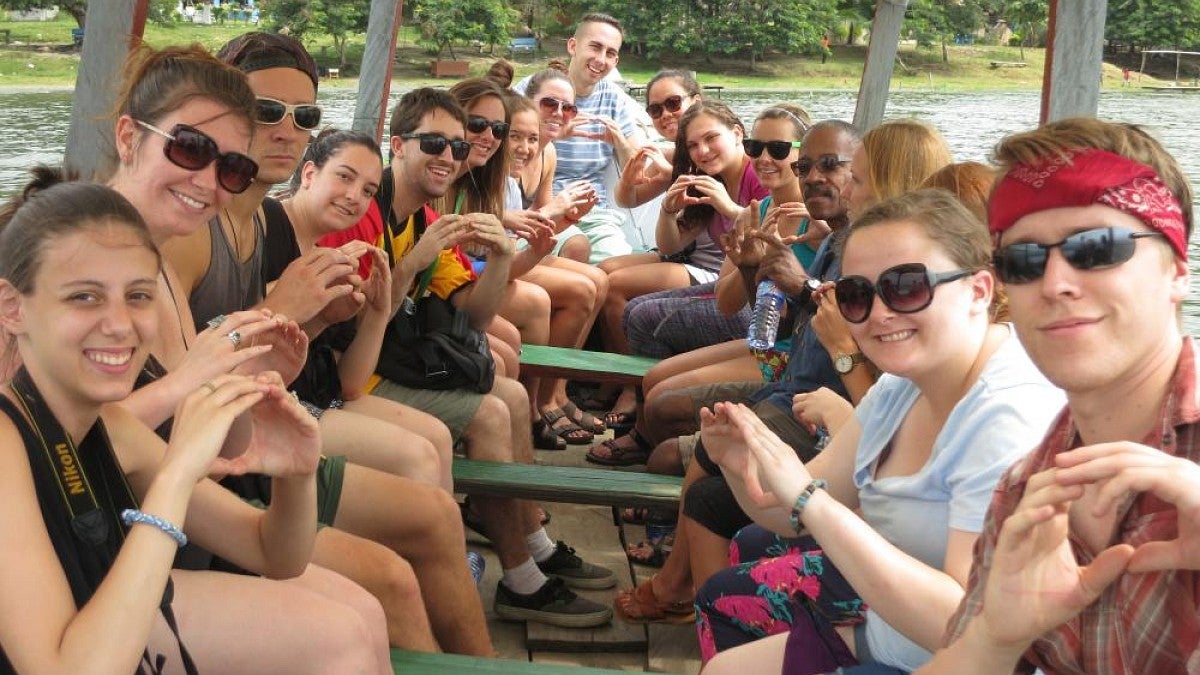Accra, the bustling capital of Ghana in West Africa, is home to 4 million people and is the hub for the UO’s Media in Ghana program. But it also is close — some would say uncomfortably close — to the Ebola outbreak in Guinea, Sierra Leone and Liberia.
The Ebola virus was just beginning to hit the headlines in the West this summer when the latest batch of students from the School of Journalism and Communication returned home, healthy and happy for the experience. Leslie Steeves, who has directed the program for 12 years, said she’s waiting to see how things develop before making decisions about next year, although she is beginning to recruit participants and is optimistic the program will go in 2015.
“I’m keeping an eye on it for next summer because we have to consult with the study abroad office if Ebola spreads to Ghana,” she said.
Steeves doesn’t want to downplay the seriousness of Ebola, but compared to the United States, Ghana’s media didn’t report on Ebola as frequently.
“We just really never heard about it from local sources,” she said. “I had to repeatedly tell my colleagues and parents that we were safe.”
“I’ve found much of the coverage of Ebola in Western media quite frustrating. Reports often erroneously generalize to all of West Africa or even all of Africa,” Steeves said.
No Ebola cases have been reported in Ghana, and the country does not share a border with any of the nations experiencing an outbreak. In fact, the United Nations has chosen Accra as the headquarters for the UN Mission for Ebola Emergency Response, which will coordinate efforts to contain the outbreak in Guinea, Liberia and Sierra Leone.
Journalism major Andrew Murray raved about his experience in Ghana. He said he learned something new every day ― whether it was about the inner workings of the newsroom or the cultural lessons he absorbed from his coworkers.
Murray’s new-found connection to the country left him feeling a little worried about Ebola and the Ghanaian economy, but he thinks the country will find a way through its financial hardships.
The SOJC’s Media in Ghana program has grown continuously since it began in 1999. With individualized media internship placements, students experience living in a culturally rich environment while working alongside Ghanaian journalists.
Originally a partnership with the University of Kansas, the UO split off and formed its current program in 2004 with nine students. Over this past summer, 16 undergraduate and graduate students spent six weeks in Accra before returning in early August. In 2012, 24 students participated in two groups, and Steeves would like to offer two groups more regularly.
Steeves, a professor and senior associate dean for academic affairs in the journalism school, said the program has provided invaluable experience for scores of students.
“There are lots of opportunities (in Ghana) for journalism and communication students,” she said. “I place my students at newspapers, radio stations, television stations, advertising agencies, public relations firms and also NGOs that are willing to host our students.”
While students work separately, they live together and contribute to a Ghana blog detailing their experiences with press conferences, taxi rides and street food.
“There wasn’t a boring day,” Murray said. “I was engaged in something really important and unforgettable.”
Ghana’s media is ranked 27th out of 180 countries on the World Freedom Press Index while the United States is listed at No. 46. Steeves said Ghana’s media hasn’t always been so free.
“Up until the year 2000, their media were tightly censored and there were laws of criminal libel and sedition that were enforced. And journalists were routinely jailed,” she said.
Today, however, Steeves said Ghana’s media is very lively. Private publications and FM radio stations make up a large portion of the media outlets in Ghana.
“Nintey-nine percent of students want to go back,” Steeves said.
―By Corinne Boyer, Public Affairs Communications intern


